What Is an INFJ?
The INFJ “Mystic” is one of the 16 Myers-Briggs® personality types. These deep, insightful personalities combine perception, intellect, and empathy to “read” people in a way that is almost uncanny. They seem to intuitively understand people and situations and how events will unfold, which is why many refer to them as “the advocates.” With their highly-developed intuition, they are constantly looking ahead to determine what will happen in the future. They crave never-ending personal growth and they are rarely satisfied with stagnancy or shallow small-talk. Rather than seeing events and situations as stand-alone occurrences, they see the inter relatedness of everything. In their quiet moments, they can often become channels of profound insights, visions, symbols, and metaphors.
Because INFJs combine Intuition with Feeling, they have a gift for understanding people and identifying their underlying needs and emotions. They care deeply about the human race and want to help people by listening, counseling, and emotionally supporting them. Helping people to realize their potential is something that drives them.
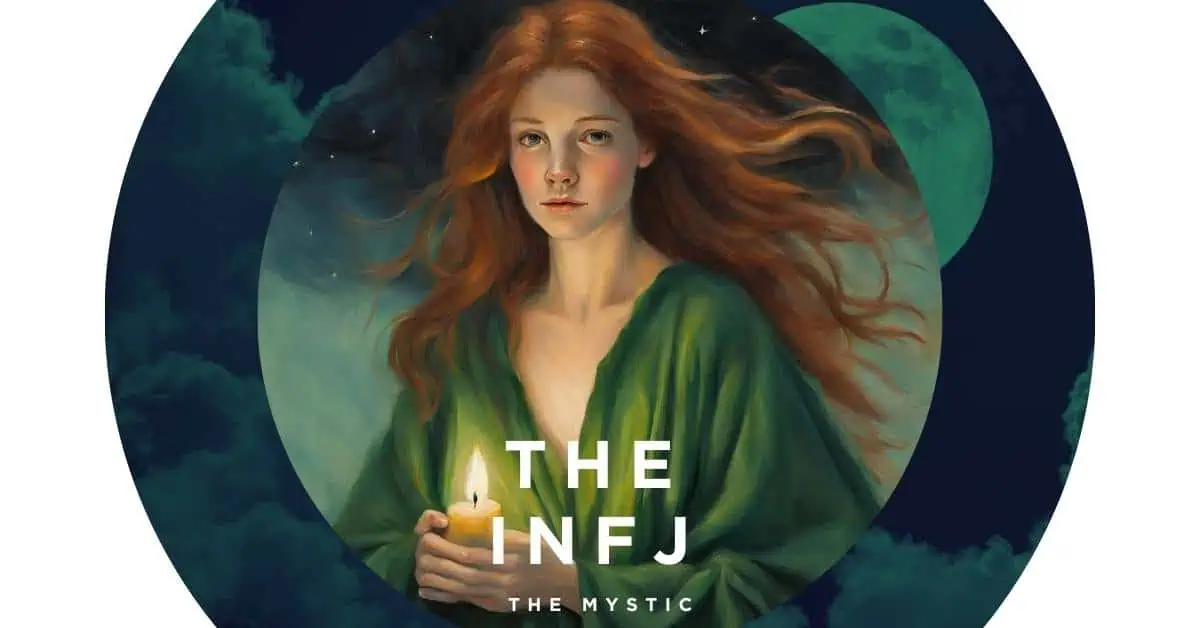
Mystics are highly attuned to people’s feelings and needs, and crave crave emotional intimacy and authenticity. But as introverts they also need ample alone time to delve into their imagination and rich inner thoughts. Many say they feel like they have dozens of theories or ideas playing on their mind on a constant basis and they can’t wait to get alone to sort through them!
If you look at many of our great philosophers and authors, you will find a plethora of INFJs – people like Dante Alighieri, Carl Jung, and Agatha Christie!
This article contains affiliate links. If you purchase an eBook from one of my links I get a small percentage back to help run my site.
What Does INFJ Stand For?
I = Introversion. “I focus inwards before outwards, analyzing what things mean to me before responding to the environment.”
N = iNtuition. “I focus more on the abstract or potential of something than the concrete or existing reality.”
F = Feeling. “I look to my personal values and inner empathy in order to make a decision. I want what is best for the group or humanity as a whole.”
J = Judgment. “I like having things settled, decided and structured. I consider myself a work-before-play person.”
Motivations and Roadblocks
- Driving Force: To understand the “dance of the universe”. To see the underlying meaning of things.
- Backup Strength: Unique understanding of people and their needs and emotions. Strong awareness of social expectations and human dynamics.
- Weakness: Can lose track of details by focusing so much on the abstract. May become out of touch with reality or panic when having to deal with a lot of details at once.
- Stressors: Lack of alone time, over-stimulation, navigating unfamiliar places, dealing with conflict, multi-tasking, focusing on nitty-gritty details.
INFJ Personality Traits:
(Keep in mind that individuals will vary based on their background and their Enneagram type)
- Visionary and forward-thinking
- Insightful
- Empathetic and considerate
- Scheduled and prefer having a plan
- Big-picture thinkers
- Need a great deal of alone time
- Recharge and refresh in low-sensory environments
- Read people easily
- Absorb the feelings of other people
- Prioritize the values and needs of the people around them
- Dislike sudden surprises and unexpected events or tasks
- Read-between-the-lines
- Intellectually curious
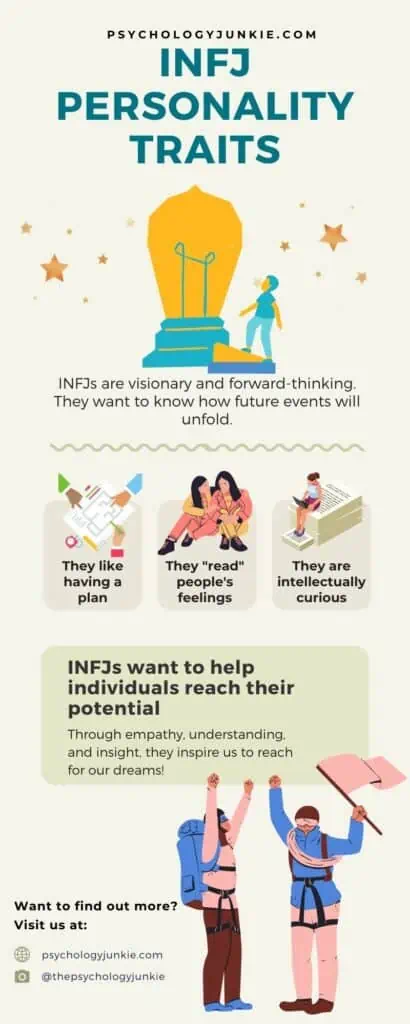
INFJ Careers:
Mystics excel at careers that make use of their creativity, insight, and predictive capabilities. In a friendly, tension-free environment, they can turn in their best work and make a real difference. Mundane repetition will stifle their imagination, so working with a variety of ideas and creative projects keeps them motivated. More than anything, it’s vital that a career line up with their personal values and that they are able to have professional integrity. Many of this type are drawn towards careers in the arts, religion, or psychology. Being able to work creatively to understand or inspire others or create something new is something that fulfills their deeper desires.
“They live life with such a sense of purpose that they often present a very task-oriented side to the world that belies their more visionary, idealistic side.”
– Linda Berens
Popular Careers for This Type:
- Psychologist
- Religious worker
- Playwright
- Marketing Expert
- Crisis Hotline Operator
- Philanthropic Consultant
- Human Resources Representative
- Teacher
- Life Coach
- Writer
- Artist
As a thank you for subscribing to my newsletter I will send you this free eBook PACKED with self-care tips, creativity hacks, and more! You'll also get a 3-day email course for understanding your personality type better!
Get Your Free INFJ eBook
Famous INFJs:
Celebrities of this type are sometimes difficult to find. This is because as an MBTI® practitioner I can’t really sit down and have a one-on-one consult with most famous people. Regardless, here is a listing of the celebrities or famous people from history to current that I believe do have INFJ preferences based on my research:
- Carl Jung
- Mahatma Gandhi
- Thomas Jefferson
- Sam Harris
- Dante Alighieri
- Simone de Beauvoir
- Agatha Christie
- Mary Wollstonecraft
- Baruch Spinoza
- Arthur Schopenhauer
- Leo Tolstoy
- Fyodor Dostoevsky
- Lars von Trier
- David Fincher
- Marilyn Manson
- Daniel Day-Lewis
- Cate Blanchette
- Rooney Mara
- Carey Mulligan
- Tilda Swinton
- Joanna Newsom
- George Harrison
- Sufjan Stevens
- Benedict Cumberbatch.
“Your visions will become clear only when you can look into your own heart. Who looks outside, dreams; who looks inside, awakes.”
– Carl Jung
How Rare are INFJs?
According to the latest MBTI® Manual, INFJs are the third rarest personality type, making up 2.3% of the population. However, according to myersbriggs.org they are the rarest personality type, making up 1.5% of the population. Either way, it’s safe to say they’re extremely rare, making up somewhere between 1-3% of the population.
But Why are INFJs So Rare?
We live in a world that highlights and admires a very pragmatic, ambitious, go-getter type of individual. INFJs are unusual in that they are drawn to the abstract more than the real; to meaning more than material. Many people, INFJs included, are pushed to bend and mold themselves into an “ideal” that is not necessarily suited to their personality type. Many parents don’t say “I want a child who sees beneath the surface and absorbs people emotions.” Rather, they say “I want a child who makes good money, gets good grades, and performs well”. I think many Mystics mistype themselves as other types because they don’t really feel they can be themselves; or there really are just fewer numbers of these types out there. The “why” is always tough to answer. But it’s clear we need people like this to help our society keep its eye on the big picture and meaning more than money.
The INFJ’s Cognitive Functions
Dominant Function: Introverted Intuition
One of the greatest strengths of the INFJ is their ability to forecast future events with only a small amount of sensory data. Their dominant or “hero” function is called Introverted Intuition, or Ni for short. Ni focuses on finding intangible or abstract connections between the unconscious world and the outer world. People who value Ni are always on a quest to find the underlying meaning, significance, and purpose behind everything. They are always trying to peer behind the scenes to find out what’s hidden and what the “dance of the universe” really is.
The goal for Mystics is to find positive meaning and move themselves towards that meaning by all means necessary. In some cases, they absorb some negative experiences in order to get to the positive outcome they want. For example, they may work themselves to exhaustion if they believe that their goal of achieving a more humane society is worthwhile.
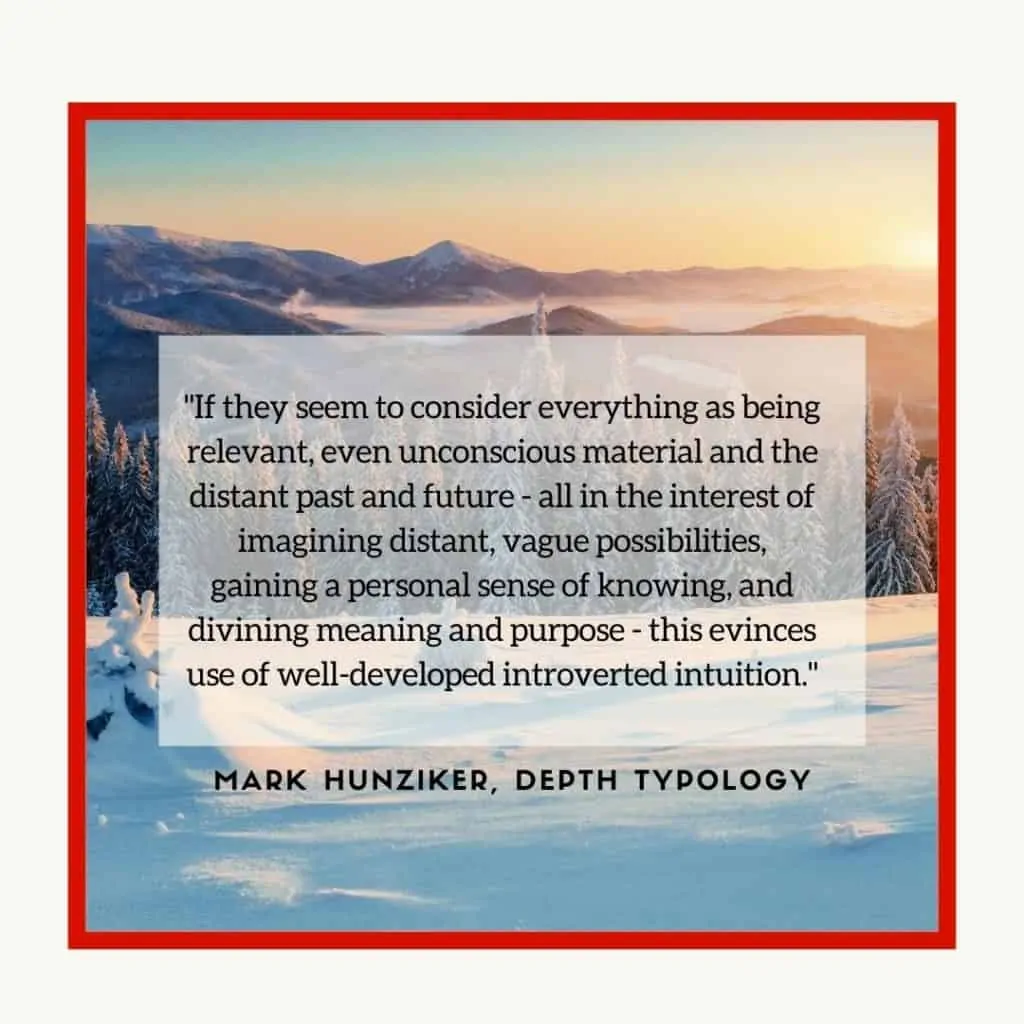
To the INFJ everything has many layers of meaning, and their goal is to get to the deepest, most innermost, secret layer.
Mystics are extremely future-focused. In fact, they can get so caught up in thinking about the future that they lose sight of the present moment. As intuitives, they are always trying to decipher what will happen someday and how events will play out. While most of the time their predictions and epiphanies appear “out of the blue,” they can also be the result of tremendous research, analysis, and synthesizing. Up until recently nobody really knew how or why the INFJ’s intuitions occurred, but neuroscientist Dario Nardi has made some progress in understanding Introverted Intuition.
According to Nardi, INFJs enter a “zen-like” brain state when they are tasked to envision the future or solve a complex problem. Nardi conducted EEG brain-wave tests that showed that INFJs, when presented with a novel or complex problem, would harness all neocortex regions in order to “realize” an answer. This zen state or realization might happen quickly or result in a sudden epiphany of insight. Usually, these insights will occur when they are in a relaxed, calm state and not distracted by a lot of noise and sensory data. You can find out more about this brain state by reading Dario Nardi’s book, The Neuroscience of Personality.
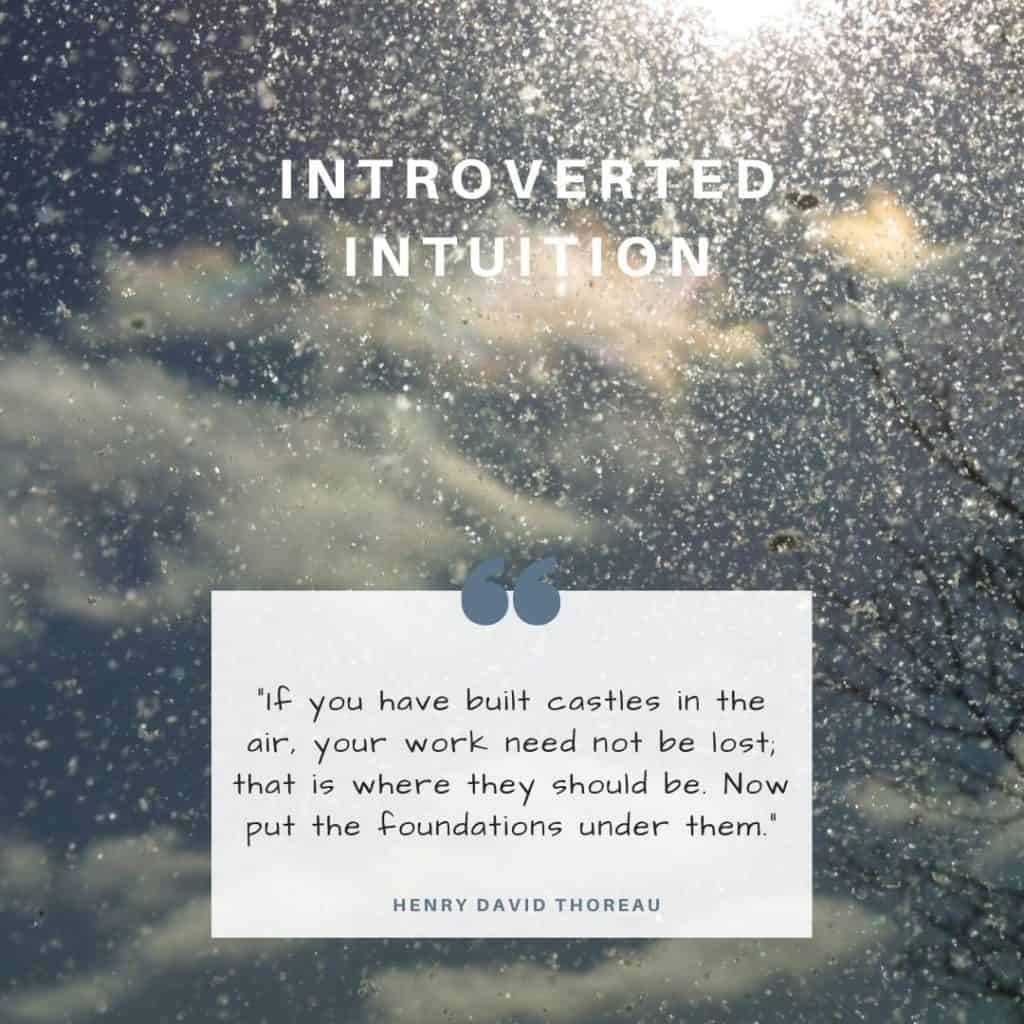
The epiphanies that Mystic’s get may be confusing even to them. They might get a sudden feeling that someone they love is in trouble or a symbolic vision in their mind might inexplicably explain something about the future. This is a quality that many people tend to disbelieve or laugh at, so INFJs are often very protective of their inner selves and are usually very guarded about sharing their intuitions. Even so, these sudden feelings and “hunches” follow them throughout most of their life. If they accept this part of their personality and embrace it they can learn to differentiate the accurate insights from what is just paranoia or worry. If they try to repress their intuition they can get their insights and a sense of paranoia mixed up and have a hard time discerning which insights are meaningful and accurate and which are just feelings of worry, apprehension, or fear.
Find out more about this personality type in The INFJ – Understanding the Mystic
Intuition in Speech and Writing
INFJs tend to think in images and symbols much of the time, and as a result, their language is filled with metaphor, symbolism, and abstract word usage. They tend to be on the quiet side, but if someone takes the time to truly listen to them they can talk a great deal and simultaneously use very little concrete data in their speech. They often pay great attention to their dreams, because they are so intrinsically connected to their unconscious. In fact, according to Building Blocks of Personality Type, Introverted Intuition “Is the only perception process that is independent of the conscious mind” and “is the only process that does not need any external stimulus.”
You can see the symbolism and language of the Mystic in the writings of Dante Alighieri, who many typologists believe to be an INFJ.
“I wept not, so to stone within I grew.”
“As one who sees in dreams and wakes to find the emotional impression of his vision still powerful while its parts fade from his mind – Just such am I, having lost nearly all the vision itself, while in my heart I feel the sweetness of it yet distill and fall.”
Auxiliary: Extraverted Feeling

INFJs will always be most at home with their intuitions and perceptions, but their second-preferred mental process is called Extraverted Feeling (Fe). Fe is all about understanding the emotions and moods of other people and maintaining morale. INFJs are keenly aware of the emotional “atmosphere” of a room can pick up on minor variations in mood and can sense when people feel uncomfortable, awkward, sad, or happy, even with very little data to go on. For some INFJs, this strength is extremely pronounced and they can have a difficult time differentiating other people’s emotions from their own. They might suddenly feel sad or afraid or angry only to realize that they were picking up on someone else’s mood, even complete strangers.
“INFJs who use intuition and extraverted feeling often report that they can “feel” someone else’s mood as if it is their own. Many INFJs report experiences of being in a building full of strangers (a grocery store, mall, etc,.) and “feeling” the sadness, fear, or anxiety of a total stranger within close proximity. Their extreme attention to the moods of others and their ability to empathize so strongly means that sometimes they can confuse other people’s moods for their own.”
– The INFJ – Understanding the Mystic
Other Mystics prefer the internal world of intuition and suppress feeling; these INFJs can appear less empathetic and warm than usual, and may appear highly reclusive. In fact, they often mistype as INTJs or INTPs.
Extraverted Feeling naturally takes into consideration the needs of others whenever they make a decision. When tasked to decide something, Feeling-Judging types will first ask themselves “what do other people need?” “What will maintain harmony?” “How will this affect everyone involved?” “What are my values regarding this?” To most INFJs, maintaining harmony and ensuring the happiness of others is of extreme importance. Many people find this quality attractive because they feel so understood, affirmed, and nurtured with them..
Many INFJs are drawn to humanitarian fields because of the fact that they are so concerned for others’ feelings and values. Their intuition is the lens with which they take in everything around them, but their feeling function is what guides their decisions. Both processes together cause the INFJ to 1) Seek deeper meaning and significance in everything they see, and 2) Look for ways to use the meanings they decipher to help or improve the lives of others.
Because of their unique strengths, many Mystics are drawn to fields in counseling, social work, or religion. In fact, according to the MBTI® Manual, INFJs are overrepresented in the fields of psychology, the arts, and religion.
Tertiary: Introverted Thinking

The third-preferred mental process of the INFJ is called Introverted Thinking, or “Ti” for short. Ti is all about searching for accuracy, classifying data internally, and understanding the underlying principles of how everything works. INFJs don’t usually develop strong use of Ti until they are in their 20’s or 30’s, at which point it becomes highly relied upon. Ti becomes a source of creativity and relief, adding objective balance to their decisions and giving them a stronger desire to find accuracy in their perceptions and insights.
INFJs who are developing Ti tend to be very careful about word usage and they enjoy analyzing problems logically and categorizing information in their mind. When they have to make a decision that will affect others, their feeling side will be their guide, but internally they are far more analytical than people realize.
Many INFJs mention feeling torn between thinking and feeling when having to make a decision. On one hand, the harmony of others is supremely important to them, on the other hand, they usually are quite aware of the inaccuracies of other people’s decisions, so they can struggle with figuring out how to balance the two opposing views. Choosing tact and empathy over logic is more comfortable in the younger years, but as they grow and mature, they may find themselves more drawn to the logical approach.
Inferior: Extraverted Sensing
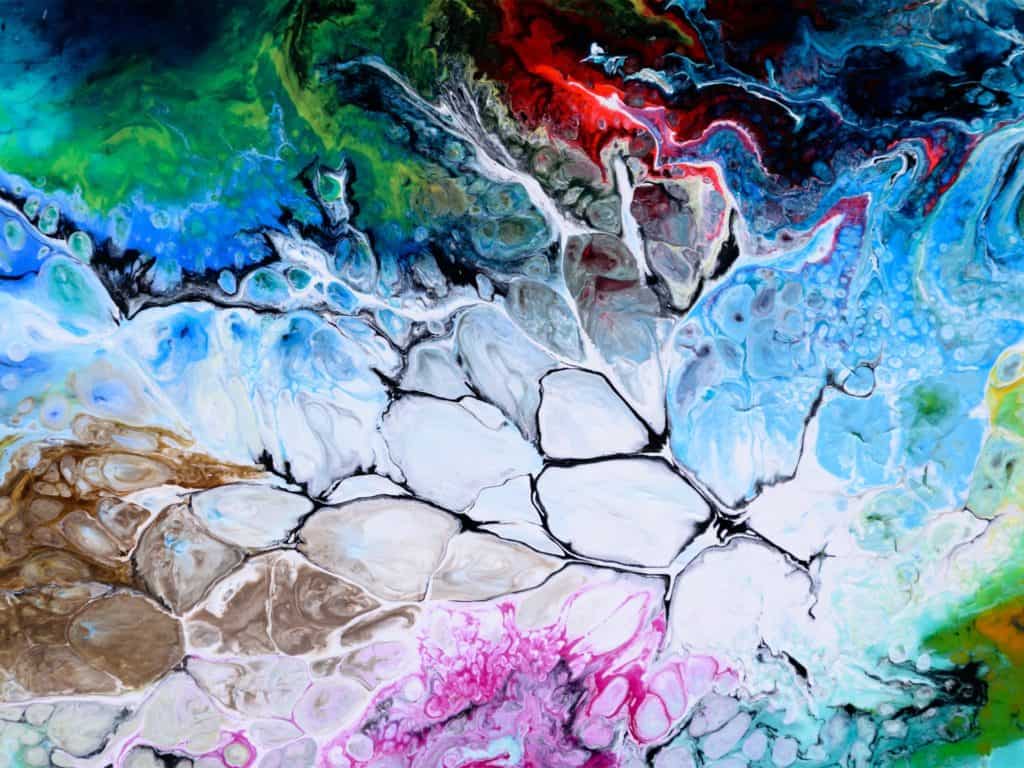
The least conscious mental process of the INFJ is called Extraverted Sensing, or “Se” for short. Se is focused on staying in tune with the present moment and noticing concrete details and realities. Se-users (ESPs and ISPs) are usually very tuned into the moment, very aware of details, and realistic and literal. INFJs, in contrast, tend to be more focused on the future than the moment, more focused on abstract impressions than concrete details, and more metaphorical than literal in their speech. Nonetheless, Se will still play a role in their life.
Se gives the Mystic an extreme fondness for beautiful surroundings and tranquil environments. When they tap into Se to find concrete data that would support a vision or insight, they can be highly detail-oriented and sharp-sighted in their perceptions. They can only stay highly “tuned in” to Se for a limited time, however, before they get over-stimulated. Since this is their inferior function they often find it overwhelming to focus on. Unlike ESPs, who can handle a lot of sensory stimulation, INFJs tend to feel easily over-stimulated and overwhelmed by bright lights, loud noises, and a lot of details. As children, they may have meltdowns when over-stimulated and as adults, they may dim the lights upon entering a room so that it’s easier for them to think. It can also be difficult for Mystics to be in new environments where they have to pay attention to a lot of concrete details. As an example, driving in new, unfamiliar cities might be stressful for them.
INFJs and Stress
When INFJs are stressed, they may fall into the grip of Extraverted Sensing. When this happens, they can seem like totally different people. They might become suddenly impulsive, reckless, and pleasure-seeking. They may try to overload their senses with stimulation; either through over-eating, drinking too much, binge-watching TV, or listening to extremely loud music. Some Mystics lash out at people or things in their environment without thought, which is highly unlike them because they usually are extremely tactful and considerate. Others want to spend all their money on a last-minute trip to somewhere they’ve never been. Typically cautious and thoughtful, they become adventurous, living for today and worrying less about the consequences than usual. You can find out more about the INFJ stress response here.
As INFJs enter their 50’s and 60’s they usually develop a more mature and balanced use of Extraverted Sensing. They tend to become more aware of details, more in tune with the present moment, and more resourceful in practical, realistic ways.
INFJs in Relationships
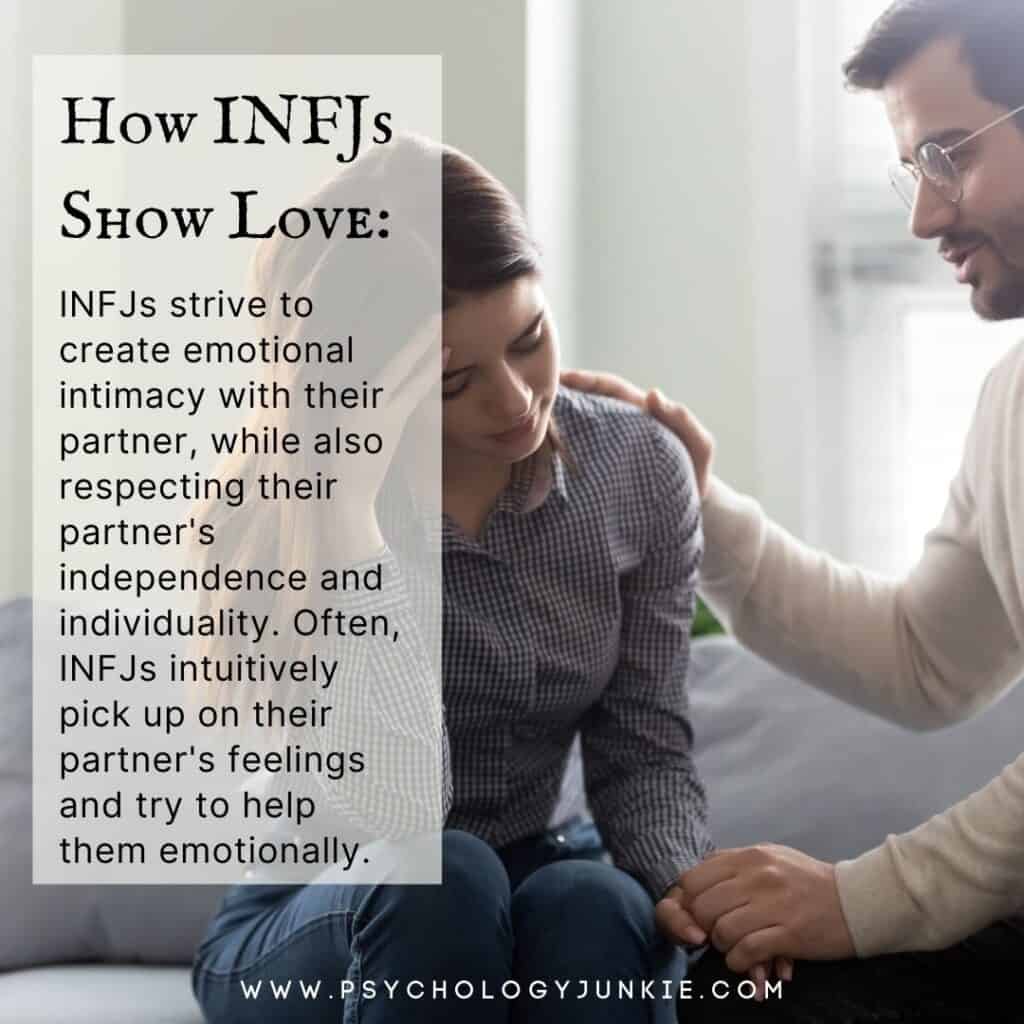
INFJs take their romantic relationships very seriously. Many are quite happy being single and don’t feel a particular compulsion to settle down or “find” romance. They would much rather be alone than with someone who isn’t ideal. As introverts, INFJs find a lot of happiness in their alone time and can actually feel overwhelmed when entering a relationship as they find themselves constantly thinking of the needs of the other person and having less of that quiet, tranquil time to themselves.
The idealism of the Mystic is both a blessing and a curse in romantic relationships. On the one hand, they are careful and cautious when entering new relationships. On the other hand, they can be overly perfectionistic and feel disappointed when their partners inevitably fail to live up to their high ideals.
“When in love, the INFJ will try to be as authentic and emotionally vulnerable as possible, which is no small feat since they are fiercely protective of their inner selves and tend to be private. It may scare them to confess their love, to write a poem, or to share a song that describes how they feel. But giving someone these long-locked pieces of their hearts is one of the most generous ways that they can show true affection.”
– The INFJ – Understanding the Mystic
When INFJs are committed to someone, they are extremely loyal and giving. Because they are often empathic, their partner’s happiness and emotional well-being becomes central to their lives. Indeed, they are willing to put their own needs on the back burner on many occasions to take care of the needs of their loved ones. Making every effort to give unconditional love, they risk burning themselves out for others. Often they don’t know how to prioritize their own needs when their partner wants something different. As a result, it’s crucial for them to give themselves space, to consider their own needs, and to get regular alone time so they can remember their goals, values, and personal desires.
More than anything, INFJs want a relationship with depth. They aren’t interested in shallow flings or small talk. Emotional connection nearly always needs to come before physical intimacy. In fact, many report that they want a near-spiritual connection with their partner. They want to understand them in the deepest possible way, both the good side and the dark side. The more honest and sincere their partner is with them, the happier they will be. However, if their partner keeps them at arm’s length or tries to hide things from them they will quickly pick up on it and tire of the relationship.
INFJ Strengths:
– Visionary. INFJs are led by their vision and are quick to grasp underlying meanings, patterns, and implications. They can quickly see how events will play out and can be very strategic in pursuing an ideal or plan for the future.
– Empathetic. INFJs deeply care about others and are usually very attuned to how other people feel. They are often good listeners and are deeply concerned with improving the world and the lives of people outside themselves. They can be very selfless in their pursuits.
– Determined. INFJs are often driven by a singular vision of the future. They trust their visions and insights with such passion that they can be relentless in their pursuit of a goal or ideal. Once they’ve settled on a path for their life they are very difficult to dissuade.
– Insightful. INFJs are quick to pick up on hidden meanings, connections, and relationships. They can often see clues and truths that other people miss or overlook. They are always asking themselves, “What else is going on here?” and so they often see things that are mysteriously absent to others.
– Creative. INFJs are usually motivated to trailblaze new and innovative paths for the future. They are highly imaginative and complex and enjoy using their imagination to write, create art, or even pursue revolutionary business ideas.
INFJ Weaknesses:
– Perfectionistic. INFJs are known for their high ideals and their grand visions. They often hold themselves to unattainable standards and get very frustrated when they fail to meet those standards. They may try so hard to be “perfect” that they are chronically unhappy with what they currently have.
– Prone to Burnout and Over-Stimulation. Because INFJs have inferior Sensing, they can easily get burned out by an overload of sensory stimulation. Also, because they have such high ideals and are so private about their inner selves they may push themselves to the point of mental breakdown without support from others.
– Isolation. Because INFJs are often misunderstood in early life, many become guarded and protective of their inner selves. They feel that nobody will ever really “get” their visions or ideas and that they will always be outsiders. They can grapple with loneliness a great deal and struggle with a feeling of separateness from others.
– Sensitive to Criticism. INFJs tend to care a great deal about harmony and about other’s perceptions of them. They also focus so much on being perfect that they can take criticism very hard and be very ashamed by its. They tend to have a hard time not taking criticism personally and can try to avoid people who are in the habit of regularly giving criticism.
– Procrastination. INFJs can take a long time to settle on a goal or decision. Because they lead with a perceiving process, they can take a lot of time analyzing, asking questions, and trying to uncover hidden truths and complexities before they decide to act. This can mean that they take too long to come to a decision or waste time looking for deeper meanings where there are none.
Fun Facts:
All facts come from the MBTI® Manual – Third Edition
- This is the least common type in the U.S. population
- They are one of two types with the highest college GPA
- These personality types rank the highest of all types in marital dissatisfaction
- Their preferred academic subjects are Art, English, and music.
- In a national sample, they ranked lowest in valuing “Health”, “Financial Security” and “Prestige & Status”
- They tend to appear in career fields involving religion, counseling, teaching, and the arts
- Their preferred leisure activities include writing, appreciating art, and reading.
Want to Find Out More About INFJs? Check Out The INFJ – Understanding The Mystic!
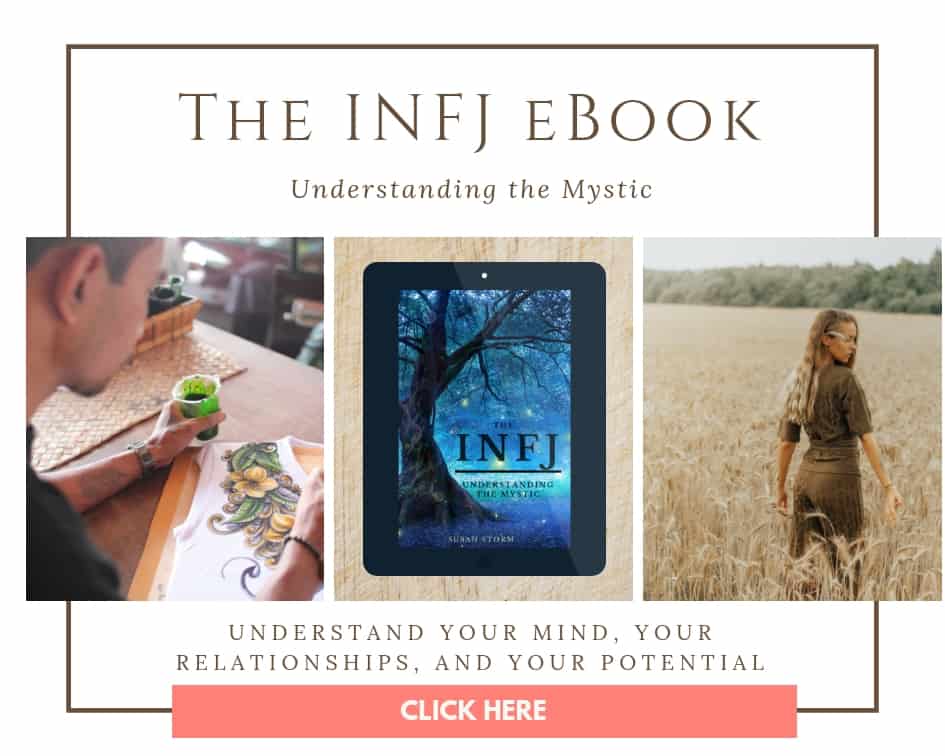
Subscribe to Our Newsletter

Want to discover more about personality type? Get the inside scoop with Susan Storm on all things typological, along with special subscriber freebies, and discounts on new eBooks and courses! Join our newsletter today!

